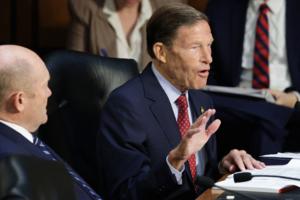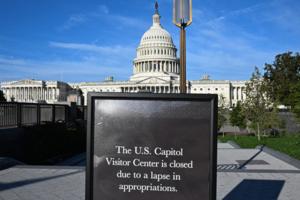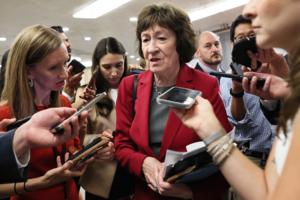Politics
/ArcaMax

Trump targets Sen. Blumenthal, calling for investigation into Vietnam service claims
President Donald Trump is targeting U.S. Sen. Richard Blumenthal again after Connecticut’s senior U.S. senator grilled U.S. Attorney General Pam Bondi on Tuesday during a Senate Judiciary Committee oversight hearing.
Trump called for an investigation in a Truth Social post into long-discussed allegations that Blumenthal lied about his ...Read more

Trump sends California National Guard to Illinois as White House seeks to extend control
SACRAMENTO, Calif. — California is challenging President Donald Trump's grip on the state's National Guard, telling a federal court the White House used claims of unrest in Los Angeles as a pretext for a deployment that has since expanded nationwide — including now sending troops to Illinois.
The Trump administration deployed 14 soldiers ...Read more

Former Rep. Jesse Jackson Jr. announces comeback bid in Illinois
WASHINGTON — Former Illinois Rep. Jesse L. Jackson Jr., who pleaded guilty to misusing campaign funds and served time in federal prison, announced a comeback bid Wednesday, entering the Democratic primary for the 2nd District.
He joins a crowded field seeking the seat being vacated by Rep. Robin Kelly, his successor in Congress who is running...Read more

Trump to speak at Miami event near presidential library site next month
MIAMI — President Donald Trump will speak at an event at the Kaseya Center next month, event organizers announced Wednesday, placing the president directly across the street from his planned high-rise presidential library.
It’s the first time the conference, called the America Business Forum, is taking place in the United States. The event ...Read more

Trump calls for Chicago Mayor Brandon Johnson and Illinois Gov. JB Pritzker to be jailed
CHICAGO — President Donald Trump called for Illinois Gov. JB Pritzker and Chicago Mayor Brandon Johnson to be jailed Wednesday, a dramatic rhetorical escalation as he tries to flood the city with federal agents and National Guard troops against the wishes of the local elected officials.
“Chicago Mayor should be in jail for failing to ...Read more

Marc Veasey, Texas Democrat drawn out of his district, will seek reelection
FORT WORTH, Texas — U.S. Rep. Marc Veasey says he is running for reelection after he was drawn out of his congressional district. The Democrat from Fort Worth has represented Congressional District 33 since 2013.
Whether he will run for that North Texas district or Congressional District 30, currently held by Rep. Jasmine Crockett, a Dallas ...Read more

Supreme Court sounds ready to revive lawsuit over ballot counting
WASHINGTON — The Supreme Court appeared ready during oral arguments Wednesday to allow a challenge led by a Republican member of Congress to Illinois’ counting of ballots up to 14 days after Election Day.
Rep. Mike Bost of Illinois and Republican presidential electors want the justices to revive their case, an outcome that experts say could...Read more

Trump endorsement in Florida attorney general race changes GOP primary outlook
TALLAHASSEE, Fla. — President Donald Trump on Wednesday endorsed Florida Attorney General James Uthmeier’s campaign to keep his seat in 2026, effectively ending chatter among the political class about the race being a proxy war between the president and Gov. Ron DeSantis.
The president’s team had been wooing House Speaker Daniel Perez, a ...Read more

Government shutdown: hellish hold times and dead-end emails
Rebecca Ferguson just wanted to be done with the government, but it seems nothing is easy during a federal shutdown. Not even obtaining the termination papers needed to finalize her departure from the U.S. Department of Health and Human Services.
The mother of three couldn’t reach a human on Tuesday when she called the Office of Personnel ...Read more

Maryland US rep. to donate pay amid shutdown, as Trump questions backpay for furloughed workers
WASHINGTON — As federal employees prepare to miss their next paycheck, several lawmakers have volunteered to join them. Rep. April McClain Delaney will go a step further.
“The Congresswoman will be donating her pay during the shutdown to nonprofits within the 6th District that address food insecurity for families impacted by cuts to SNAP ...Read more

Lawsuit accuses Miami Dade College of violating Sunshine Law on Trump library
MIAMI — A new lawsuit aims to overturn Miami Dade College’s decision to deed over property adjacent to the Freedom Tower to the state, even though the governor and Florida Cabinet have already voted to gift the land to Donald Trump’s presidential library foundation to build a high rise.
In a complaint filed this week in Miami circuit ...Read more

President Donald Trump calls for Chicago Mayor Brandon Johnson and Illinois Gov. JB Pritzker to be jailed
CHICAGO — President Donald Trump called for Illinois Gov. JB Pritzker and Chicago Mayor Brandon Johnson to be jailed Wednesday, a dramatic rhetorical escalation as he tries to flood the city with federal agents and National Guard troops against the wishes of the local elected officials.
“Chicago Mayor should be in jail for failing to ...Read more

Stopgap fix or separate bill may be needed to unlock shutdown pay
WASHINGTON — A draft memo from White House budget office counsel arguing there’s no obligation to pay furloughed workers after a government shutdown may have some legal merit in at least one procedural aspect, even critics acknowledge.
To guarantee retroactive pay when the shutdown ends, Congress might need to either amend the current House...Read more
Editorial: At Navy event, Trump focuses on himself and his grievances
It’s been several years since President Barack Obama stood at Naval Station Norfolk in front of active-duty sailors and compared Republicans to bugs in need of extermination.
In a rambling speech, Obama made specious claims about the armed forces, asserted that he predicted the Sept. 11 terrorist attacks, and urged uniformed service members ...Read more
Editorial: This shutdown is as pointless as all the others
With funding expired, new appropriations bills stalled and progress on a stopgap nonexistent, Congress has for the 15th time since 1981 allowed the federal government to shut its doors. Don’t expect this round to be any more edifying than the others.
Republicans want to extend current spending levels until November, as a bill passed by the ...Read more

Editorial: How to make an American 'war zone'
If a U.S. president was just itching to militarize the streets of a politically unfriendly American city like some blustery third-world despot, how would he go about it?
First, he might start with a pretense that verges on legitimate — say, immigration enforcement. But rather than the routine kind of enforcement that quietly happens all the ...Read more

No civility in a shutdown? For Congress, security fears and rhetoric collide
WASHINGTON — The calls came swiftly and from all across the political spectrum after the assassination of Charlie Kirk.
“We need every political figure, we need everyone who has a platform, to say this loudly and clearly: We can settle disagreements and disputes in a civil manner, and political violence must be called out. And it has to ...Read more

Judge OKs ballot language in lawmakers' bid to repeal abortion rights in Missouri
JEFFERSON CITY, Mo. — A Cole County judge on Tuesday approved revised language for a ballot question asking voters to restrict abortion in Missouri, putting a legal case over the issue on track for an appeal to a higher court.
Circuit Judge Daniel Green upheld Secretary of State Denny Hoskins’ second attempt to write a ballot summary for a ...Read more

Gov. JB Pritzker says President Trump deploying troops to Chicago due to 'dementia' and obsessive fixations
CHICAGO — In a scathing critique of President Donald Trump, Illinois Gov. JB Pritzker on Tuesday accused the Republican president of deploying National Guard troops to the Democratic cities of Chicago and Portland based on fixations that stem in part from his being mentally impaired.
“This is a man who’s suffering dementia,” Pritzker ...Read more

Boston Mayor Wu to headline 'No Kings' protest amid sanctuary battle with feds
Boston Mayor Michelle Wu is set to headline a “No Kings” protest on Oct. 18, roughly a month after the city was sued by the Trump administration over its sanctuary policies that the feds see as thwarting their widespread immigration crackdown.
Wu, who has battled with the Trump administration over immigration and other policies in recent ...Read more
Popular Stories
- Trump eyes health care talks with Democrats to end shutdown
- Closed, canceled and turned away: Shutdown leaves tourists in limbo
- Trump's fixation on loyalty is bad for nation
- The American Experiment requires robust debate, not government crackdowns
- Democratic candidate asks court to order Florida Gov. Ron DeSantis to set special election in Palm Beach County






















































